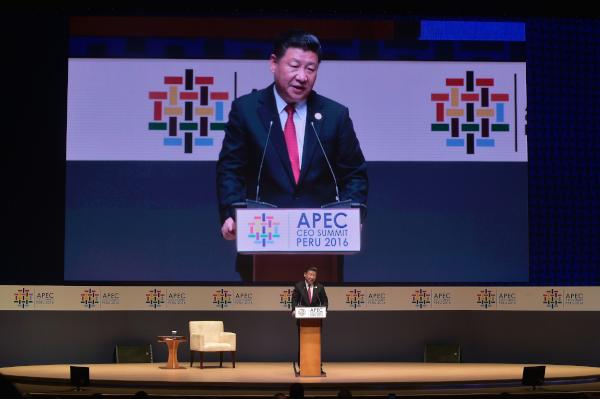Chinese President Xi Xinping pledged on Saturday to further open the world’s second-largest economy, as leaders of Asia-Pacific countries gathered in Lima to find new free-trade options while the United States is expected to take a more protectionist stance.
The annual APEC summit got under way in Lima just over a week after Donald Trump won the U.S. presidential election, casting doubt that the largest-ever U.S.-proposed trade deal, the Trans-Pacific Partnership (TPP), will come to fruition.
President Barack Obama championed the TPP as a way to counter China’s rise, but his administration has now stopped trying to win congressional approval for the deal that was signed by 12 economies in the Americas and Asia-Pacific, excluding China. Without U.S. approval the agreement as currently negotiated cannot come to fruition.
Trump campaigned strongly against free-trade deals, vowing to pull the United States out of the TPP and promising to impose tariffs on imports from some countries.
China’s Xi is selling an alternate vision for regional trade by promoting the Beijing-backed Regional Comprehensive Economic Partnership (RCEP), which as it stands excludes the Americas.
“China will not shut its door to the outside world but open more,” Xi said in a keynote address.
With the TPP all-but dead following Trump’s victory, China’s talks on RCEP are seen as the only viable path toward the broader a Free Trade Area of the Asia-Pacific (FTAAP) that APEC aspires to.
“We are going to involve ourselves in economic globalization and we back FTAAP,” XI said. “We’re going to … make sure the fruits of development are shared.”
The administration of President Barack Obama has warned that the RCEP would not include protections for workers, the environment or intellectual property.
Despite China’s overtures, some APEC members are determined to press on with TPP. Peru and Japan signed a joint statement pledging to work harder to put into force the 12-nation accord.
Mexico, Japan, Australia, Malaysia, New Zealand and Singapore, however, aim to continue with TPP with or without the United States, Mexico’s Economy Minister Ildefonso Guajardo said on Friday.
The 21 members of APEC have also finished a study for a regional free-trade area that was designed to examine lessons learned from TPP and RCEP talks, but they will not discuss it until the next annual summit in Vietnam.
Though most were careful not to criticize Trump directly, leaders at APEC, which ends on Sunday, universally warned of the dangers of turning away from globalization and free trade.
Asked about the dangers of protectionism, Australian Prime Minister Malcolm Turnbull said, “It is the way to poverty.”
“We know – we have seen this film before,” he told journalists on Friday. “The world did this in the 1930s after the Great Depression and in fact made it much worse.”
Trump has called the TPP a job-killing “disaster” and a “rape of our country.”
